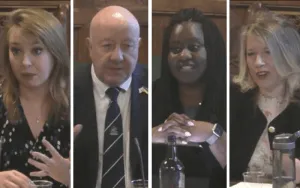A new campaign by a disabled people’s organisation is highlighting how a string of projects are driving change in their local community through the principles of co-production.
Wiltshire Centre for Independent Living (WCIL) launched its Listen Up Wiltshire campaign in 2019 to amplify the voices of disabled people, asking them: “What is it you want to tell Wiltshire?”
Out of that simple question has come a string of publications and campaigns that have helped make change happen locally and have influenced the community and local services, while also allowing them to “take back control”.
All the projects have been co-produced with disabled people, with service-providers working with people with lived experience to design – or improve – the services they will be using.
WCIL is now trying to spotlight the 12 projects that have so far come out of Listen Up Wiltshire, which it hopes will show the true value of co-production.
Kate Tutssel, WCIL’s personalisation lead, said: “It’s not difficult, and it’s not scary, and it does make a difference.
“Co-production is so important, but simply by nature of the word it sounds complicated and difficult, but it’s not… and it’s fun as well.
“The people who have created some of these campaigns have really enjoyed doing it, getting to know other people, working together, and it’s been a confidence-builder for them as well.”
The funding has come through support for WCIL’s user engagement team from Wiltshire County Council and the local NHS, through Bath and North East Somerset, Swindon and Wiltshire Clinical Commissioning Group.
Among their co-produced schemes, WCIL has produced a guide to accessible walks in Wiltshire; created a guide for employers (PDF); run a project on effective co-production within the NHS; and worked with a local organisation to ensure its annual fundraising event was accessible to disabled people (pictured, above left).
They have also published guides on creating accessible venues (PDF) and inclusive gyms (PDF); launched an awareness-raising campaign around disability employment; produced a video showing how supermarkets can be made more inclusive; and worked as co-researchers on a project looking at how robots can support the rights of disabled people (pictured, above right).
Tutssel said: “We go to a lot of meetings where people talk about co-production, there’s a lot of talk about it, but not a lot of doing of it, and we’re doing it.
“And by doing this spotlight series we can showcase that and bring more people along for the ride and show it isn’t difficult, especially the NHS.”
She said Wiltshire was “nowhere near the top of the ladder” on co-production, and there was “further to go”, but WCIL was trying to push beyond basic consultation and engagement and towards the ultimate aim of having services that are co-designed by disabled people.
Meanwhile, WCIL is continuing with new co-produced projects, and is working on a scheme that aims to improve accessible bus travel in the county through producing training material for bus drivers, and another that aims to design basic standards for accessible homes.
And WCIL’s SpeakUp Wiltshire Group, whose members are closely linked to the co-production work, has also begun work on its “very ambitious aim” of transforming the personal independence payment assessment system.
Tutssel said: “PIP is a real frustration for people. People’s experience is so horrendous and difficult.
“If they can share their experience and knowledge with other people locally it will make things easier and better for them.”
But they also hope to influence the Department for Work and Pensions by pointing out what does and does not work, and how PIP can be improved.
She said co-production was important because it “gives people a voice”.
She said: “It puts people with lived experience at the forefront and centre of all of it and ensures they are not an afterthought.
“If you’re designing a service for disabled people then don’t design it for them, design it with them, because they are the people who are going to use it and they are the experts.”
Tutssel said WCIL was starting to see progress among the organisations they are working with.
She said: “What’s been really great is the pieces of work that we’ve done over the last few years, they then pick up on and refer to when they are writing their strategies, so it is influencing what they are doing and they are taking notice of it.”
A note from the editor:
Please consider making a voluntary financial contribution to support the work of DNS and allow it to continue producing independent, carefully-researched news stories that focus on the lives and rights of disabled people and their user-led organisations.
Please do not contribute if you cannot afford to do so, and please note that DNS is not a charity. It is run and owned by disabled journalist John Pring and has been from its launch in April 2009.
Thank you for anything you can do to support the work of DNS…

 Disabled peers speak of ‘daily fight’ against access barriers in House of Lords
Disabled peers speak of ‘daily fight’ against access barriers in House of Lords Lords is ‘aeons ahead’ of Commons on access, disabled MP tells colleagues
Lords is ‘aeons ahead’ of Commons on access, disabled MP tells colleagues Minister told it is ‘not too late’ to change direction and stop favouring big charities
Minister told it is ‘not too late’ to change direction and stop favouring big charities